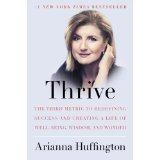
As a perpetually connected organizer, I could relate to the "techno-stress" Arianna Huffington writes about in 'Thrive'.
I recently finished reading Arianna Huffington’s latest book, Thrive: The Third Metric to Redefining Success and Creating a Life of Well-Being, Wisdom and Wonder, and I have three words to describe it: It’s. About. Time.
Anyone who has a job that requires constant connectivity can identify with the social diseases of time famish and perpetual distraction. Using studies and anecdotes from her own time-strapped life that led to her collapse of exhaustion at work from stress and an emergency room visit, Huffington makes a compelling case for why the way many U.S. workers live is not only joyless – but unhealthy.
Stress. Exhaustion. Insomnia. Burnout. They have all been linked to physical illnesses like high blood pressure, heart disease and even premature death.
As a full-time –- largely online -- campaign staffer for the family advocacy organization, MomsRising.org, I am grateful to live a balanced life. For one, MomsRising advocates for policies that allow for parents to raise their children with dignity: paid sick days, paid family leave, fair and realistic wages, and high-qualify, affordable childcare. We also live the values that we preach by allowing all workers to work from home.
TAKE ACTION: DYK that the United States is one of seven countries worldwide -- the others are Papua New Guinea, Suriname, Nauru, Palau, Samoa and Tonga -- that do NOT guarantee some paid maternity leave? Click here and tell Congress to pass the FAMILY Act now!
Working from home has allowed me to be available to my children when they most need me like doctor’s appointments and parent-teacher conferences. I have the flexibility to drop off and pick up my kids at school, prepare dinner for my family, and complete household chores in addition to putting in my eight hours at work.
But even then, I am very busy. I don’t stop, maneuvering from one task to the next. I check my e-mail constantly -- at the supermarket counter, at family members’ homes over the holidays and almost all weekends. Here’s a nugget inThrive that I could relate to:
"Our relationship with email has become increasingly one-sided. We try to empty our in-boxes, bailing like people in a leaky lifeboat, but more and more of it keeps pouring in. How we deal with our email has become a big part of our techno-stress. And it’s not just the never-ending deluge of emails we never get to – the growing pile that just sits there, judging us all day – but even the ones we do get to, the replied-to emails that we think should be making us feel good."
The average knowledge economy employee now spends 28 percent of his or her time dealing with email – more than 11 hours a week. Yikes.
But it could be worse. In my case, I could work full-time outside the home, have a hellish commute and have all the childcare and household chores waiting for me when I got home – the “second shift” Arlie Russell Hochschild once aptly coined. The reality is too many caregivers work two and three shifts, unable to reap the joys of their work. Also fromThrive:
“According to a 2008 Pew report, when asked what was important to them, 68 percent of Americans replied, ‘having free time.’ It ranked even higher than having children, which came in at 62 percent, and a successful career, at 59 percent. Yet the way many of us choose to live doesn’t reflect those priorities. As long as success is defined by who works the longest hours, who goes the longest without a vacation, who sleeps the least, who responds to an email at midnight or five in the morning – in essence, who is suffering from the biggest time famine – we’re never going to be able to enjoy the benefits of time affluence.”
Amen. Huffington’s solutions may seem obvious, but in our “always-online”, fast-paced, 24-hour social media culture it’s radical. And for this equally round-the-clock connected urban mom of two, she made a compelling case for living a third metric life: one that is based on ample sleep, time with family, and community service or giving.
I made many of the small changes that she suggested, and have noticed big returns. For one, I dropped the 5 a.m.workouts and started sleeping in comfy pajamas rather than my workout clothes. I stopped checking e-mail most evenings and the times over the weekend that I am with my kids – and I stopped apologizing for it! I allow days to go by without updating either my Twitter or Facebook pages.
I feel great, and contrary to what I once thought, it has not hurt my career. I urge everyone to try it. Pick up a copy ofThrive and let me know what you think!



The views and opinions expressed in this post are those of the author(s) and do not necessarily reflect those of MomsRising.org.
MomsRising.org strongly encourages our readers to post comments in response to blog posts. We value diversity of opinions and perspectives. Our goals for this space are to be educational, thought-provoking, and respectful. So we actively moderate comments and we reserve the right to edit or remove comments that undermine these goals. Thanks!